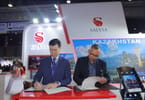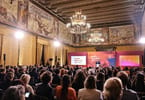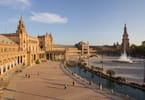Eastern Europe is experiencing an interesting political phase. Vladimir Putin is trying to push the former USSR states into a Custom Union that is his initiative for making his political philosophy of “integration” into an economic reality, while the European Union (EU) wishes to expand its writ in Eastern Europe farther by engulfing Moldova and the Ukraine, although both countries are economically weak and can burden the already “bankrupt” EU.
The Political battle of integration and EU expansion is hanging in the balance in Kiev as the Ukraine has now just some hours to decide whether it wishes to continue its political journey towards the EU or wishes to keep walking with its historic partner, Russia. Ukrainian and Russian relations have been a mix of hate and love for centuries, but they have yet to disintegrate socially and financially from Russia although they were disintegrated geographically two decades ago. The youth of the Ukraine that were born in the Free Ukraine looks towards Europe, while its political clout that belongs to the USSR era is psychologically integrated with Russia, its former master.
The Ukraine actually has to make this decision by November 19, 2013. As a first step, Kiev has to release former Prime Minister of Ukraine Yulia Tymoshenko for joining the EU trade union membership. Yulia, the heroine of the “Orange Revolution,” is in jail under corruption charges. Political costs for the Ukraine to join the trade union looks very expensive, because Russia will take away its military installations immediately from the Ukraine if it signs a trade union, but the Ukraine has no legal and diplomatic confirmation from the EU that it will get a 100% EU membership. So at one side there is a 100% risk to leave a close ally that is providing natural gas, military support, free visa, and a lot of social and trade benefits, while on the other side there is no confirmation to join the EU as a full member. The Ukrainian leadership is looking double minded over this issue.
The meeting of EU foreign ministers will convene on November 18 to decide if they will sponsor the Ukraine’s trade association membership or not. Before the Vilnius summit on November 28-29, the Ukraine has to prove it is ready to adhere to EU standards including deciding the Yulia issue and releasing her from jail.
Former Polish Prime Minister, Aleksander Kwasniewski, who chairs the European Parliament’s observation mission in Ukraine, is of the view that November 19 would be the last opportunity for Ukraine’s parliament to pass a bill freeing Tymoshenko. The Ukrainian President Yanukovich says he has no plans to issue a pardon decree to Tymoshenko. Yanukovich believes that Parliament can a pass a law that can allow Tymoshenko medical treatment abroad. But who is in majority in Parliament? Of course, the political party of President Yanukovich.
Yanukovich held a meeting with his Russian counterpart, Vladimir Putin, last week but interestingly no communique was issued after their meeting. Political observers claim both presidents apparently failed to reach any decision over certain burning issues that are harming relations between the Ukraine and Russian, including gas import and EU membership.
EU officials spent the last week in Kiev trying to reach an agreement over Julia’s release from jail. The EU has apparently failed to ensure Yulia’s release, which indicates the Ukraine is not ready to compromise on the Yulia Yanukovich issue, because this is one of the most important political issues for the sitting government that got ahold of power by painting Yulia as the most corrupt politician during the last presidential elections and defeated her party although she had huge support from the western media and was considered as “Western baby.” Eastern European media in February 2013 claimed that Evgenia Tymoshenko, daughter of the former Ukrainian Prime Minister Yulia Tymoshenko, met with US President Barack Obama and discussed the fate of her mother with him, requesting the US to put pressure on the Ukraine to release her mother, but the US failed to get results although the US clamped a ban on Ukrainian officials to visit the US who were involved in the arrest of Yulia Tymoshenko. She was jailed in 2011 for a gas deal she brokered with Russia in 2009 and allegedly had kickbacks in this politically-motivated deal.
Political observers of Eastern Europe believe that the Tymoshenko issue is not the only factor that would leave the Ukraine in a political stalemate – rejected by the EU and isolated from Russia. The Ukraine is nearly bankrupt and may require an expensive $10-15 billion IMF bailout almost immediately upon its associate membership, a liability the EU has to weigh into consideration.
“The EU, perhaps, is bankrupt as well; it’s not in [a] position to welcome new members and certainly has no largess,” Martin McCauley, an Eastern Europe expert from the University of London said in his interview with an Eastern European television station.
“[The] European Union is in … big trouble economically and politically. Would Germany, the key country, welcome another EU member, especially one which is bankrupt? The answer is ‘no’ in the long term, ‘yes’ but in the short term, they have doubts,” McCauley said.
Europe has been courting the Ukraine into an associate trade membership for the past four years and has created a geopolitical battle with Russia who has already started punishing the Ukraine for its move by imposing chocolate bans and long delays at the borders. The Ukraine is one of the best chocolate-producing countries in Eastern Europe, and CIS countries (mainly Russia) are its market. Slow cargo clearance at Russian borders is hampering Ukrainian trade. The trade deficit of the Ukraine is increasing very sharply, as exports are constantly decreeing while imports are increasing. In the period from January to September 2013, the deficit of foreign trade in goods and services jumped by UAH389.6 million to US$5,835.8 million year over year. The volume of trade with the Commonwealth of Independent States (CIS) was US$42,329.3 million, a decrease of US$7,939.9 million or 15.8% year over year. In the period of January-to-June 2013, the deficit of foreign trade in goods and services increased by UAH3,002.1 million to US$797.4 million over the year. In 2012, the deficit of Ukraine’s trade in goods and services worsened by US$2,370 million to US$9,027 million against 2011.
Russian has categorically indicated that it would remove all “sensitive” production facilities from the Ukraine if the association agreement with the EU is signed. “We will not be able to place certain sensitive technology in Ukraine; we will have to completely localize them on Russian Federation territory. This means problems connected with the future cooperation in the aircraft and space industry and many more spheres,” Russian Deputy Prime Minister Dmitry Rogozin told reporters recently in Moscow. He believed that the Eastern Partnership program, to be considered at the forthcoming EU summit in Vilnius during the last week of November 2013, is dangerous for the European bloc as the new associations “meant that [the] EU was collecting countries that were not simply experiencing an economic crisis, but were on a brink of default.” The third Eastern Partnership Summit will take place on November 28-29 in Vilnius, the capital of Lithuania, which currently holds the rotating presidency of the European Union. The conference is dedicated to strengthening trade ties between the European economic bloc and six states in Eastern Europe and the Caucasus – Armenia, Azerbaijan, Belarus, Georgia, Moldova, and Ukraine. All of these countries are from the former USSR economic bloc. Interestingly, Armenia in September reiterated its relations with Russia and avoided any early breakup from the Russian economic bloc.
Russia is currently building its own economic bloc – the Customs Union – under the umbrella of Putin’s new political theory “integration.” Armenian President Serzh Sarksyan announced full support to the Russian economic bloc after meeting with Vladimir Putin in September. Armenia said it would join Russia in the Customs Union, as well as engage in the Eurasian integration process instead of negotiating a free trade agreement with the EU. The move is seen as a political victory for Putin, who has been rounding up former Soviet states to rival the EU, promising lower gas prices and other trade perks. The three-member customs union of Russia, Kazakhstan, and Belarus was founded in 2010 as a counterweight to the EU. Putin hopes to expand it into a “Eurasian Union”- a political and economic union of post-Soviet states like Belarus, Kazakhstan, Kyrgyzstan, Russia, and Tajikistan.
It has been suggested that the Eurasian Union could also include other countries that have been historically or culturally close, such as Finland, Hungary, the Czech Republic, Bulgaria, Vietnam, Mongolia, Cuba, and Venezuela. This is expected to incorporate the countries into a common body where Russian would be the common language of communication and economic cooperation.
Russia is Armenia’s largest trading partner, and the largest foreign investor trade between the two countries reached $1.2 billion in year 2012 and Russian capital investment was over $3 billion, or nearly half of Armenia’s foreign investment. In July, Armenia engaged in technical talks on a “deep and comprehensive free-trade agreement” (DCFTA) with the EU, and observers largely expected the country to initiate a free trade agreement with the EU at the Vilnius summit in late November.
Political observers of Eastern Europe are keen to see the Ukrainian decision in the next couple of weeks, while the youth of Ukraine are also waiting to see what happens, because their future is related with the EU visa regime, and they will be in serious job crisis if Russia imposes a visa regime over them and the EU takes more time to offer them a EU visa regime.
www.dnd.com.pk
WHAT TO TAKE AWAY FROM THIS ARTICLE:
- ” Eastern European media in February 2013 claimed that Evgenia Tymoshenko, daughter of the former Ukrainian Prime Minister Yulia Tymoshenko, met with US President Barack Obama and discussed the fate of her mother with him, requesting the US to put pressure on the Ukraine to release her mother, but the US failed to get results although the US clamped a ban on Ukrainian officials to visit the US who were involved in the arrest of Yulia Tymoshenko.
- The EU has apparently failed to ensure Yulia's release, which indicates the Ukraine is not ready to compromise on the Yulia Yanukovich issue, because this is one of the most important political issues for the sitting government that got ahold of power by painting Yulia as the most corrupt politician during the last presidential elections and defeated her party although she had huge support from the western media and was considered as “Western baby.
- So at one side there is a 100% risk to leave a close ally that is providing natural gas, military support, free visa, and a lot of social and trade benefits, while on the other side there is no confirmation to join the EU as a full member.






















